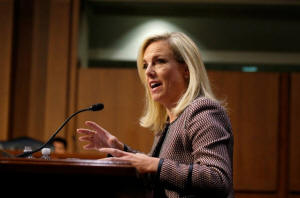|
U.S. to resume refugee admissions from 11
'high-risk' countries
 Send a link to a friend
Send a link to a friend
 [January 30, 2018]
By Yeganeh Torbati [January 30, 2018]
By Yeganeh Torbati
WASHINGTON (Reuters) - The United States
will resume admissions for refugees from 11 countries identified as
presenting a high security risk, but with extra vetting for these mostly
Middle Eastern and African nations, senior U.S. officials said on
Monday.
The changes came after a 90-day review of refugee admissions from Egypt,
Iran, Iraq, Libya, Mali, North Korea, Somalia, South Sudan, Sudan, Syria
and Yemen by the State Department, Department of Homeland Security and
intelligence agencies.
The new rules are the latest changes to the U.S. refugee program made by
the administration of President Donald Trump to address what it sees as
national security issues.
Some of the administration's actions, including an executive order to
temporarily ban all refugees, have sparked lengthy court battles.
Refugee advocates have said they see the administration's actions as
intended to reduce the number of refugees, particularly those from
Muslim countries.

During the review period, which lasted from late October to last week,
admissions of refugees from those countries dropped sharply, according
to a Reuters analysis of State Department data.
The changes announced on Monday include additional screening for certain
people from the 11 countries, and a periodic review of a list of
countries identified as presenting higher security risks.
The new guidelines were announced at a press briefing by senior
administration officials, who spoke on condition of anonymity. They
offered no details about which people from the 11 countries will be
subject to the extra screening, citing security concerns.
The list of "high-risk" countries was last updated by the Obama
administration in 2015, the senior administration officials said.
U.S. Department of Homeland Security Secretary Kirstjen Nielsen would
like officials to factor in risks to the United States other than
terrorism, such as transnational organized crime, a senior
administration official said.
During the briefing, officials said refugees will not be barred from
admission to the United States solely on the basis of nationality.
"The big picture is that there is no longer a refugee pause on
countries, including the 11 high-risk countries, with these measures
taking effect," one senior administration official said in a briefing
with reporters. "We'll be resuming admissions with the new security
measures in place."
[to top of second column]
|

U.S. Secretary of Homeland Security Kirstjen Nielsen testifies to
the Senate Judiciary Committee on "Oversight of the U.S. Department
of Homeland Security" on Capitol Hill in Washington, U.S., January
16, 2018. REUTERS/Joshua Roberts

In an address at the Wilson Center on Monday morning, Nielsen spoke
about the new security measures, saying they "seek to prevent the
program from being exploited by terrorists, criminals and
fraudsters."
"These changes will not only improve security but importantly they
will help us better assess legitimate refugees fleeing persecution,"
she said.
Refugee advocates said they worry the new security measures will
block refugees from the 11 countries from admission to the United
States.
"Adding yet more hurdles to an already overly bureaucratic process
will burden those seeking safety for themselves and their families,"
Amnesty International USA said in a statement.
Since becoming U.S. president, Trump has imposed numerous limits on
the refugee program, including capping the number of refugees
allowed into the country in the 2018 fiscal year at less than half
the number set by former President Barack Obama for 2017. He also
issued an executive order pausing the refugee program pending a
thorough review, instituted stricter vetting requirements and quit
negotiations on a voluntary pact to deal with global migration.
For each of the last three years, refugees from the 11 countries
made up more than 40 percent of U.S. admissions. But a Reuters
review of State Department data shows that as the 90-day review went
into effect, refugee admissions from the 11 countries plummeted.

Since Oct. 25, the day the 90-day review went into effect, 46
refugees from the 11 countries have been allowed into the United
States, according to State Department data.
(Reporting by Yeganeh Torbati; Writing by Susan Heavey; Editing by
David Gregorio and Lisa Shumaker)
[© 2018 Thomson Reuters. All rights
reserved.]
Copyright 2018 Reuters. All rights reserved. This material may not be published,
broadcast, rewritten or redistributed.
Thompson Reuters is solely responsible for this content. |